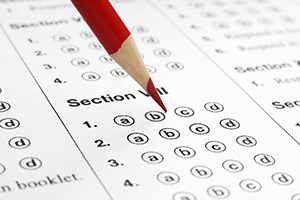By Stefanie Jackson
On Tuesday night, the Accomack school board learned about the latest requirements under the state Standards of Accreditation (SOA) and the federal Every Student Succeeds Act (ESSA) and the heavy impact those requirements will have on local public schools.
Director of Accountability and Curriculum Sandy Drummond explained that the new SOA mandates only affect high school students and Standards of Learning (SOL) testing as related to graduation requirements.
Students who pass a course and the accompanying SOL test (or another assessment approved by the Virginia Board Of Education) receive what is called a verified credit.
Students who have earned all the verified credits they need to graduate are not required take any more SOL tests, even if SOL tests are available for the courses they are currently taking.
It’s a “completely new way of thinking,” Drummond said.
Eliminating unnecessary testing may seem like a positive outcome, but there’s a catch for school staff: they must account for every end-of-course test taken by each student, an exceedingly long and arduous task.
Additionally, if a student unintentionally takes one too many tests, staff must file a testing irregularity report within 24 hours of discovering the discrepancy.
The extra work falls on school testing coordinators.
School board member Gary Reese asked Drummond if that is the reason Gov. Ralph Northam wants Virginia schools to hire more guidance counselors.
Accomack school guidance counselors will not be burdened with the extra workload, but hiring more guidance staff would help the division more closely align with Northam’s goal of maintaining a ratio of one guidance counselor for every 250 students in Virginia schools.
The current state average is one guidance counselor for every 425 students.
Furthermore, state and federal guide-lines discourage schools from exempting students from exams as a reward for passing the SOLs, except for Algebra I, biology, and English reading and writing.
School board member George Waldenmaier disagrees with exempting students from exams for any reason.
“At the risk of being boringly redundant, I remain skeptical about exempting students from exams in general. I believe it disadvantages college-bound kids, to go to college where they’re going to live and die by exams, and then we minimize their exam exposure,” he said.
Director of Secondary Education Karen Taylor answered, “And with this policy change, they’re all going to be taking exams now.”
Waldenmaier also said that exempting students from exams influences their “lack of success on AP (advanced placement) tests, where kids are not used to the rigor.”
Taylor asserted that students struggle with AP tests because they are timed, whereas SOLs are not.
ESSA requires all high school students to take at least one science SOL and one math SOL before graduating. Virginia specifies the biology SOL and the Algebra I SOL as the required tests.
This incentivizes students to perform better in biology, because they can no longer rely on another course such as earth science to give them the verified credit in science needed for graduation, Taylor said.
Virginia high school students who entered ninth grade between the 2011-2012 and 2017-2018 school years must earn at least six verified credits to graduate. A student with six verified credits and 22 standard credits earns a standard diploma. A student with 26 standard credits and nine verified credits earns an advanced diploma.
Students working toward a standard diploma must earn two verified credits in English, one in math, one in lab science, one in history or social science, and one in any additional course of their choice.
Students working toward an advanced diploma must earn two verified credits in English, two in math, two in lab science, two in history or social science, and one in any additional course of their choice.
The new testing requirements take effect immediately; letters notifying parents of the changes will be sent home after Christmas break.
Sign in
Welcome! Log into your account
Forgot your password? Get help
Password recovery
Recover your password
A password will be e-mailed to you.



